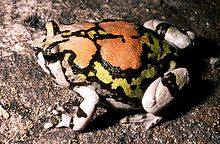- Scaphiophryne gottlebei
-
Rainbow Burrowing Frog 
Conservation status Scientific classification Kingdom: Animalia Phylum: Chordata Class: Amphibia Order: Anura Family: Microhylidae Subfamily: Microhylinae Genus: Scaphiophryne Species: Scaphiophryne gottlebei Binomial name Scaphiophryne gottlebei
Busse and Böhme, 1992Scaphiophryne gottlebei, commonly known as Malagasy Rainbow Frog, Ornate Hopper, Rainbow Burrowing Frog, Red Rain Frog, Gottlebe's Narrow-mouthed Frog, is one of the most highly decorated of the Madagascan frogs. In 2008, the Malagasy rainbow frog was named as "being among the rarest and most remarkable amphibians" on the planet by the Zoological Society of London.[1] Thousands are captured every year for the pet trade.[2]
Contents
Characteristics
The painted burrowing frog is a small, roundish, brightly coloured species with a distinctive white, red, green and black pattern on the back. The skin of the back is very smooth, but the skin of the grey belly is a little bit rough. The ears are inconspicuous, but the eyes are prominent.
Adapted for both the underground and climbing lifestyles, the painted burrowing frog has horny tubercles on the underside of the hind feet to help with burrowing, and claws on the forefeet for clinging to vertical canyon walls. The frog can climb vertical rock faces to escape floods or predators. It is able to live under the ground up to 10 months living on insects.[1]
The tadpoles are very conspicuous, quite big, and blackish.
Size
Female length: 30 – 40 mm Male length: 20 – 30 mm
References
- ^ a b Smith, Lewis (2008-01-21). "The weird and wonderful ‘must be saved with cute and cuddly’". London: The Times. http://www.timesonline.co.uk/tol/news/environment/article3221833.ece. Retrieved 2008-01-21.
- ^ Behler, John L.; Deborah A. Behler (2005). Frogs: A Chorus of Colors. New York: Sterling Publishing Co., Inc.. pp. 121. ISBN 1-4027-2814-X.
External links
- Arkive.org Painted Burrowing Frog
- Amphibian.co.uk Madagascan Burrowing Frogs
- Amhibianweb.org Scaphiophryne gottlebei
This Microhylidae article is a stub. You can help Wikipedia by expanding it.

